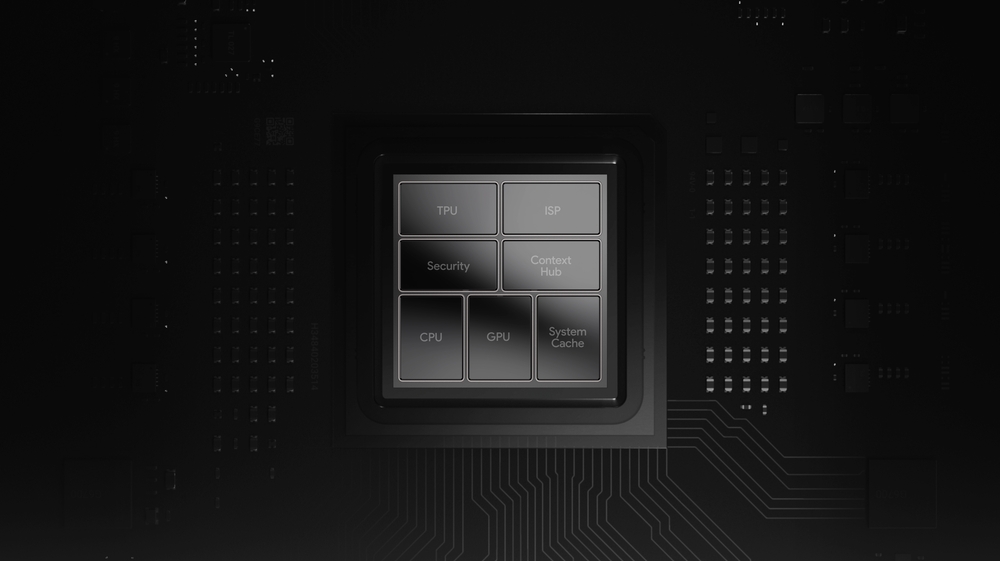What is the Google Tensor chipset? Pixel 6's new chip explained
Google's secret weapon

As stylish and distinct as the Google Pixel 6 range looks, it’s what’s going on inside that’s arguably most exciting, as Google has for the first time used an in-house chipset for its phones.
Dubbed the Google Tensor, this was first revealed a while back, long before the full unveiling of the Pixel 6 and Pixel 6 Pro, but details were light, and now we know a whole lot more about it.
Below then we’ll cover exactly what the Google Tensor chipset is, and why it could be the Pixel 6’s secret weapon.
What is Google Tensor?
Tensor is the first processor designed by Google, and it’s been custom-made for Pixel phones. That second point is a big deal, as it means you probably won’t see this in any non-Pixel handsets. It also means that Tensor is built from the ground up to be as good a fit as possible for the Pixel 6 range.
That’s in contrast to Qualcomm’s Snapdragon chipsets which power the majority of Android phones. With those, you’ll find the same chipset in a number of handsets, and while Qualcomm might in some cases work in collaboration with device makers to get as much as possible out of the chipset, its chipsets are typically closer to being off the shelf options than truly custom ones.
How powerful is Google Tensor?
Google Tensor has two high-power cores, two mid cores, and four high-efficiency cores, though Google hasn't gone into much more detail than that about these cores.
However, the company claims that the Tensor chipset allows for up to 80% faster performance than the Pixel 5. That’s a big number, but then the Pixel 5 shipped with a mid-range Snapdragon 765G chipset.
Sign up for breaking news, reviews, opinion, top tech deals, and more.
So that, coupled with the fact that it’s a year old, means Tensor isn’t necessarily any more powerful than the likes of the Snapdragon 888 powering the OnePlus 9 and many other Android flagships.

One thing Google has noted though is that Tensor is more focused on ensuring components work well together than them offering peak performance individually. That might mean it doesn't top benchmarks, but that it could work better in the real world.
Beyond that, Google hasn’t directly compared it to rival chipsets, and leaks disagree on whether it’s slightly more or slightly less powerful than the best alternative Android chipsets.
But you can certainly expect it to be one of the more powerful chipsets you’ll find in an Android phone, and it has more than just power going for it, as we’ll discuss below.
What else does Google Tensor have going for it?
The Google Tensor isn’t just about raw power. Google Tensor is designed with on-device machine learning and AI in mind, allowing it to improve things like speech recognition and image processing, making translation, Google Assistant, the camera, and other aspects of the phone faster and more accurate.
For example, this allows the Pixel 6 to instantly translate messages and videos using the new Live Translate feature, and means that the camera can take even better photos, with shots – even of low light things like starry nights – looking much closer to how you remember them.
Tensor also does similar for video recording, allowing for more accurate and vivid colors, even when shooting 4K footage at 60fps.
And face detection when taking photos should also be faster and more accurate thanks to Tensor.

Google claims that Tensor will allow both for improvements to existing features and for entirely new ones, such as the newly announced Motion Mode, Face Unblur, and Speech enhancement mode for videos.
The company also says that it empowers the Pixel 6 range to keep getting better over time.
Tensor can do much of this while also saving power compared to other chipsets according to Google, leading to longer battery life.
What about security?
Another thing Google has shouted about is how secure this chipset is. Tensor has a security core (which means sensitive tasks can run in a dedicated environment) and it’s joined by a Titan M2 security chip. Between the two, this makes the Pixel 6 range more resilient to attacks than previous models in the range.
In fact, Google claims that the Pixel 6 and Pixel 6 Pro have the most layers of hardware security of any phone, and independent security lab testing has shown that it can withstand all sorts of high-tech threats, such as electromagnetic analysis, voltage glitching and laser fault injection.
The Google Tensor chipset also allows the Pixel 6 to get five years of security updates, where other Android phones mostly only get a few years of these.
Is Tensor cheaper for Google?
One final potential advantage of Google making its own chipset is that it doesn’t have to pay another company such a Qualcomm, so by cutting out the middleman it could eventually save money. But the key word there is eventually.
While Google hasn’t spoken about the financials of Tensor, M. Brandon Lee of This is Tech Today recently argued that it takes a lot to develop a new chipset, and that while savings might happen eventually they won’t do so for years.
Still, if and when they do that could potentially mean reduced prices for the phones, or allow Google to invest that money into other tech and features that might make it into future Pixels. But that’s a benefit for another chipset and another time.
- Check out all the Google Pixel 6 colors
James is a freelance phones, tablets and wearables writer and sub-editor at TechRadar. He has a love for everything ‘smart’, from watches to lights, and can often be found arguing with AI assistants or drowning in the latest apps. James also contributes to 3G.co.uk, 4G.co.uk and 5G.co.uk and has written for T3, Digital Camera World, Clarity Media and others, with work on the web, in print and on TV.